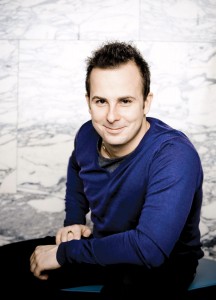Q&A: Yannick Nezet Seguin, A Hero for the Philadelphia Orchestra
The Philadelphia Orchestra’s charismatic new conductor and artistic director, Yannick Nezet-Seguin, 36, arrives at a pivotal time for our embattled and legendary symphony. He’ll take the baton on November 5th through 7th, conducting Mozart’s Symphony No. 40 and Brahms’s A German Requiem (then again in December and January) before officially replacing the great Charles Dutoit in fall of 2012.
Hi, Maestro. Wait, is that what I should call you? Maestro? With my orchestra in Montréal, in rehearsal they call me “Maestro,” and at break they call me Yannick. It’s two hats I have to wear.
So if we see you on the streets here … Well, I’d answer to “Maestro,” but to Yannick probably more quickly.
How much of the 2011 season did you get a say in? Charles Dutoit is still the conductor. But he gave me complete freedom for my own program, because this is the bridge season—the first time I show my colors.
Looking forward to anything specifically in these programs? The Requiem. A great requiem. Requiems are about death, yes, but they’re more than that. When a composer writes a requiem, it’s almost always his masterpiece, almost always the best of himself. Last year we did Mozart. This year, the Brahms. And Brahms is my favorite composer.
Conductors allow themselves favorites? We maybe shouldn’t—that’s why I hesitated with you just now. I’ll say that in second place, I have many, many composers.
You once said that you want to honor the great legacy of the Philadelphia Orchestra and bring new concert experiences in 2012. What’s that look like? The most important thing is not to not play again the Beethoven symphony, but to put it in a program where its neighbors help us understand and appreciate Beethoven in a different way. The design of this is like opening a window, seeing those pieces with fresh eyes. If it has to do with a more unusual concept of program—extra-musical or visual—then I’m willing to do it, the same way that my fantastic and illustrious predecessor of nearly 100 years, Leopold Stokowski, was willing.
Where do you find inspiration? As a conductor, as every musician does, I am serving musical geniuses, whether it’s Brahms or all the others. But the fantastic thing is that I have to serve human beings. I have 100 souls onstage who somehow have to be really unified in order to transmit the power of music, which can happen only if they have the confidence and trust in themselves to express completely what they want. My reward and inspiration is when I feel that the musicians on stage are free to express themselves.
Any pre-show routines? I used to be terrible, very grumpy when I took naps. But I’m trying to reverse that. It’s a lot of energy you put out out there. I’m a very physical conductor. I train like I’m an athlete, running, lifting weights.
What do you say to people who think orchestras—classical music—have outlived their time? Classical music has survived time. That’s why it will never outlive its time. We need classics. They tell us where we’re from, where we’re going, and as a society, a world, as humans, we need this.
What should we see this season, other that your program? In Montréal, we always talked about how well Dutoit did Ravel, like no one else. Also, Elektra in concert version. That piece grabs you by the throat from the first note and keeps you to the end.
Is it scary coming to an orchestra that just filed Chapter 11? Does that touch you at all? I came to Philadelphia because I believe in the past and present and—mostly—in the future of this orchestra. What I’m responsible for is to be the defender of energies, of the musicians, the staff, the boards, the president. I’m in touch, trying to bring the belief that together we can overcome that situation. Right now it’s just a moral role, though of course that will grow as the position grows with the Orchestra.
Mozart or Beethoven? I’m conducting Don Giovanni as we speak. So I’ll say Mozart. But that might change when I conduct Beethoven.
Paris or London? I’m Quebecois, so Paris is the mother city. But if I had to, I’d choose London because of the vibe.
You get one song on a desert island for the rest of eternity. What is it? I think I will disappoint you: I think I’ll choose to listen to the silence. We have this faculty as human beings to hear a piece once and remember it. I would choose to listen to my inner iPod, and choose to hear all.
This article originally appeared in the September 2011 issue of Philadelphia magazine—on newsstands now.



